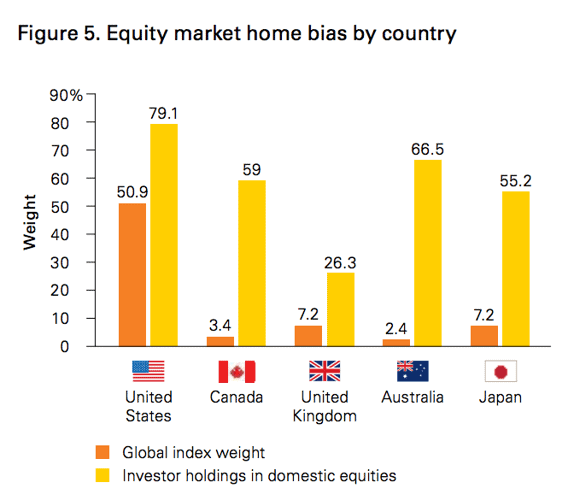Behavioral Finance: Home Country Bias
It was last June when we wrote about a few behavioral finance topics. While markets aren’t as volatile as they were 12 months ago, and headlines surrounding the stock market may not be as divisive, we thought it would be helpful to review some investing basics through the lens of our time-tested belief that “today’s headlines and tomorrow’s reality are seldom the same.” By sharing our objective outlook, we hope to alleviate some of our clients’ short-term emotional anxiety while achieving better long-term financial results for them.
In theory, financial markets are efficient. All necessary information is available to the public and logical decisions can be made by rational, unemotional investors. However, theory and reality are often quite different, and investing is no exception.
The study of investor behavior is called Behavioral Finance. For more information on the basics, see our post “Behavioral Finance: Intro”. Research shows that people are not nearly as rational when making investment decisions as traditional finance theory suggests. Our decision-making is influenced by our own psychological biases.
What is “Home Country Bias”
Most people have a tendency to buy what they already know. Be it, shopping at the same stores or buying the same brand. It’s usually easier to buy what you know than to make a decision on something new. Stocks are no exception.
Investopedia defines Home Country Bias: “investors’ tendency to favor companies from their own country over those from other countries or regions.”
How Home Country Bias Can Impact Your Portfolio
The global stock market is a popular benchmark to evaluate your own portfolio against. The US market accounts for roughly 55% of the global stock market, which would suggest 55% being the ideal weighting of US equity in a portfolio. On average, US investors own between 70% and 80% US stocks. Many of us are more familiar with the past returns of the US stock market than international markets. But being overweight domestic equity can pigeonhole the portfolio and bring about excess risk that could potentially be diversified away. To stress the importance of diversification, the Corporate Finance Institute reported, “no single country contained the best-performing equity investments for more than two years in a row over the past 25 years.”

In a 2016 study conducted by Vanguard, they found significant home country bias in 5 of the most developed markets in the world. It confirms the idea that people tend to purchase what they are familiar with. The Australian market only makes up ~2.4% of the global market index, yet Australian investors are holding 66.5% of their equity in their home companies. At PDS, our goal is to help clients avoid a home country bias by owning a globally diversified mix of stocks and bonds.
The Value of a Professional Advisor
It is important to understand the connection between your investments and the long-term goals of your financial plan. One of the primary benefits of working with a professional advisor such as PDS Planning is our ability to provide discipline and guidance to manage our innate psychological biases. According to research by Vanguard, “Behavioral coaching may add 1% to 2% in net return”. As they explain, “Having emotions isn’t a “rational or irrational investor issue; it’s a human issue.” While most investors have the best intentions when making financial decisions, in the heat of the moment when emotions are elevated, they may have a hard time sticking to their plan.
Since 1985, PDS Planning has worked with clients to eliminate the stress often associated with planning your financial future. With over 30 years of experience helping clients plan their investments, we’re experts at optimizing an investment plan to each individual’s highly specific needs. We’ll work to understand your vision for the short and long-term. And we will provide objective guidance on the proper path to help reach your goals.
To learn more about PDS Planning, please contact us.
Please remember that past performance may not be indicative of future results. Different types of investments involve varying degrees of risk, and there can be no assurance that any specific investment, strategy, or product or any non-investment related content, made reference to directly or indirectly in this newsletter, will be suitable for your individual situation, or prove successful. This material is distributed by PDS Planning, Inc. and is for information purposes only. Although information has been obtained from and is based upon sources PDS Planning believes to be reliable, we do not guarantee its accuracy. It is provided with the understanding that no fiduciary relationship exists because of this report. Opinions expressed in this report are not necessarily the opinions of PDS Planning and are subject to change without notice. PDS Planning assumes no liability for the interpretation or use of this report. Consultation with a qualified investment advisor is recommended prior to executing any investment strategy. No portion of this publication should be construed as legal or accounting advice. If you are a client of PDS Planning, please remember to contact PDS Planning, Inc., in writing, if there are any changes in your personal/financial situation or investment objectives. All rights reserved.
